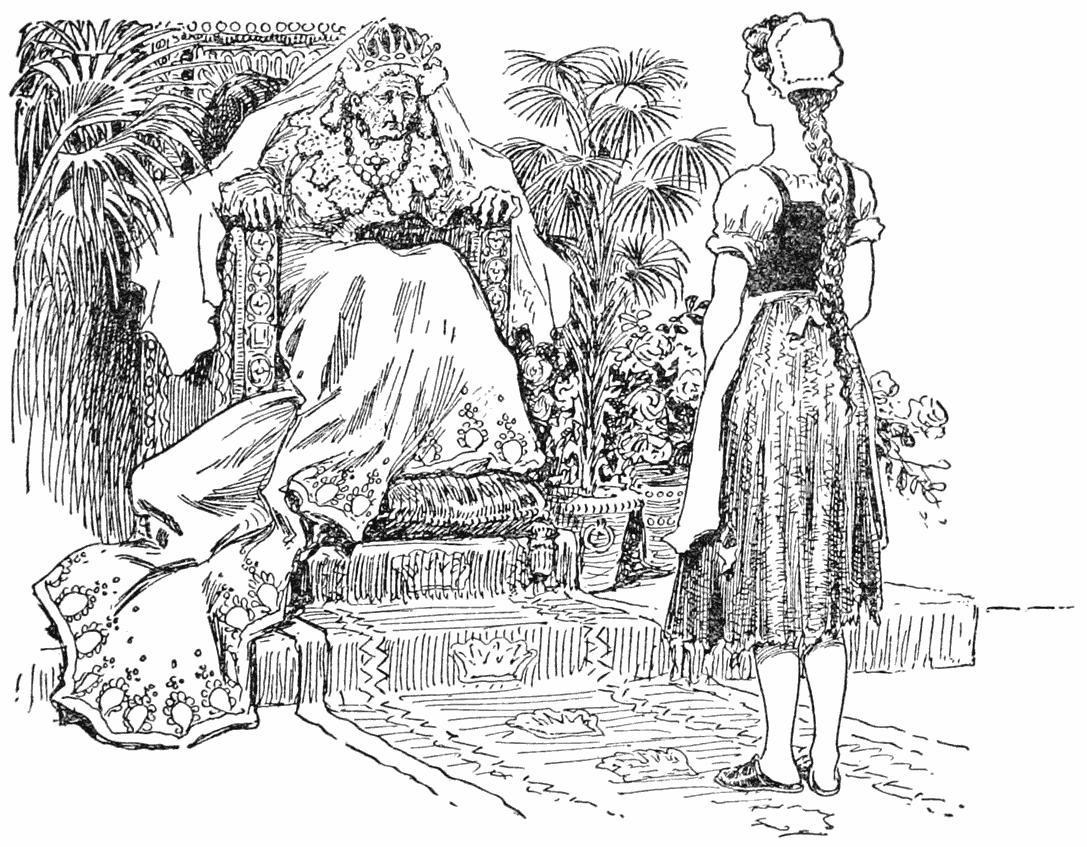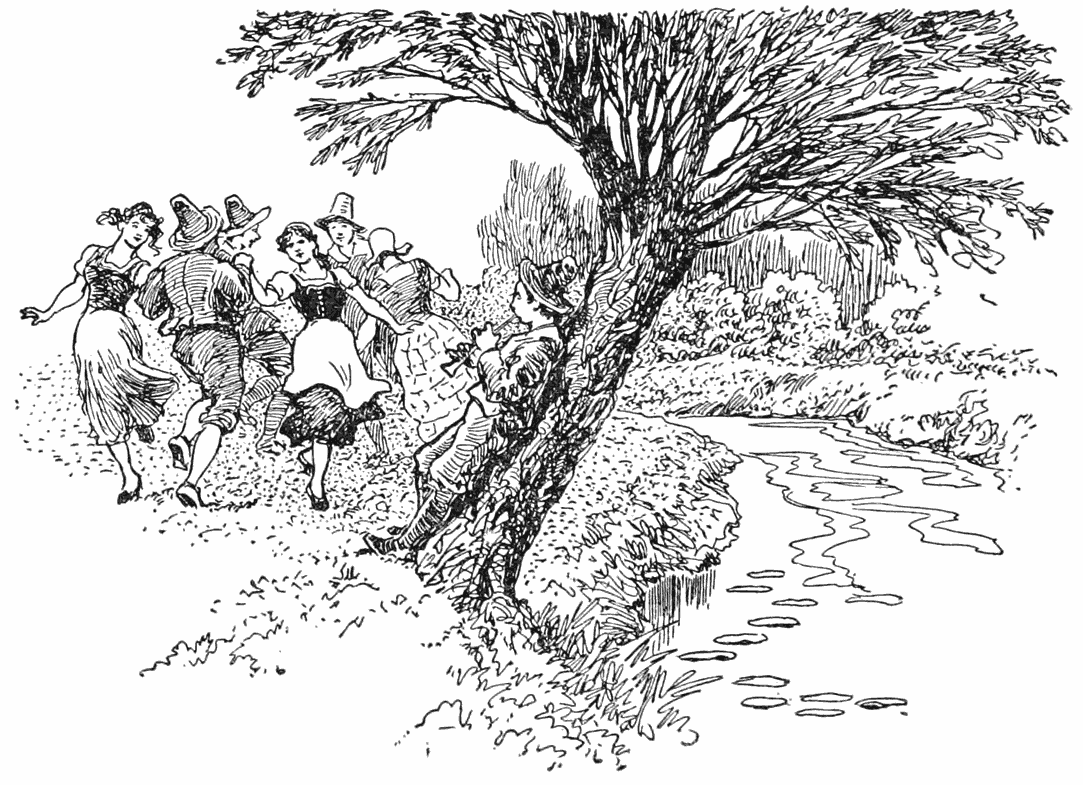PERONELLA
Once upon a time there was a Queen so old and ugly, so bent down under the weight of years and infirmities, that she grew weary of life, unless her youth could be renewed to her. A fairy who had been present at her birth now paid the Queen a visit, and told her that if she could find a young girl willing to change places with her Majesty,—to give her bloom and youth in exchange for the Queen’s old age and scepter,—then the fairy by one wave of her wand would fulfill their desire.
The Queen was delighted, for she would much rather be poor, young, and healthy, than a rich queen who was too old and infirm to enjoy life. She therefore ordered the strictest search to be made throughout her dominions for a young girl who would be willing to give her youth in exchange for age, infirmities, and riches. It was not long before several discontented and ambitious girls came to accept the offer; but when they saw how feeble and helpless the old Queen was, how she could eat nothing but gruels and soups, how wrinkled and withered she was, how many times she said over the same thing, and how she tottered about bent double over her cane, they said they preferred their own conditions, poor and humble as they were, to the riches and the hundred years of her Majesty.
Afterwards there came some persons of a still more ambitious nature; to these the Queen promised grand titles and high honors. At first they were very willing; but when they had stayed a short time with her Majesty, they left the room, shaking their heads and saying, “Of what use would all the Queen possesses be to us, since we should then be so disfigured and so ugly that we should be ashamed to show ourselves to any one?”
At length a young maiden from a country village presented herself. She was exceedingly beautiful, and declared herself willing to accept the crown in exchange for her youth. Her name was Peronella. At first the Queen was very angry at her presumption, for the girl was very poor; but, after all, what did that matter when the Queen’s purpose was to grow young again? She proposed to Peronella to divide the kingdom with her.

“You shall have one half, and I the other,” said she. “Surely that is enough for you, who are but a poor country girl.”
“No,” replied Peronella, “that will not satisfy me at all; I will have the whole, or I will remain a country girl, strong and beautiful and active, while you keep your wrinkles and your hundred years.”
“But,” said the Queen, “what shall I do if I give away my whole kingdom?”
“Do?” said Peronella. “Your Majesty will laugh and dance and sing as I do”; and she laughed and danced and sung before her.
The Queen, who could do nothing like this, asked Peronella how she would amuse herself if she were Queen, for she knew nothing of all the infirmities of age.
“I really cannot be quite sure what I would do,” answered Peronella, “but I have a great mind to try the experiment, for every one says it is such a fine thing to be a queen.”
While the Queen and Peronella were coming to an agreement, the fairy entered the room, and said to the country girl, “Are you willing to make the trial, and see what it is like to be a queen, extremely rich, and a hundred years old?”
“I have no objection,” said Peronella.
In a single instant her skin became wrinkled, her hair turned gray, her teeth dropped out, her back was bent double, and she felt herself become helpless, and crippled, and ill-natured; she was already a hundred years old. The fairy touched a bell, and a crowd of officers and courtiers trooped in, all richly dressed, to do homage to the Queen and fulfill her will. A sumptuous repast was set before her, but she had not the least appetite, and, besides, she could eat nothing but soups and gruels; she did not know what to say, or how to behave, and was ashamed of the figure she must be making, especially as she sat where she could see herself in a looking-glass, and know all the time how very ugly she was.
In the meanwhile the real Queen stood in a corner, smiling all the time to see how fresh and comely she had become. Her hair was beautiful, her skin was soft and rosy, her teeth were white and firm, and her figure was strong and tall. She could skip about as nimbly as a deer; but she was dressed in a coarse, rough, short petticoat, and her cap and apron were poor and torn. She scarcely dared move in such clothes as these, and the guards, who never allowed such countrified, ragged-looking people within the palace gates, pushed her about with the greatest rudeness. Peronella, who was watching her, now said: “I see it is quite dreadful to you not to be queen, and it is still more so to me to be one. Pray, take your crown again, and give me my ragged petticoat.”
The change was immediately made: the Queen grew old again, and Peronella was as young and blooming as she had been before. Hardly had this taken place when each began to repent of her haste and to wish she had tried a little longer. But it was now too late; the fairy required them to remain forever in their own conditions. The Queen cried all day long over her aches and pains, saying: “Alas, if I were but Peronella! I should, it is true, sleep in a poor cottage and live on potatoes, but I should dance with the shepherds under a shady elm to the music of a flute. Of what use is a bed of down to me, since it gains me neither sleep nor ease; or so many attendants, since they cannot make me comfortable?”
So the Queen’s fretfulness increased her pain; nor could the twelve physicians, who constantly attended her, be of the least service. She died about two months later.
Peronella was dancing with her companions on the fresh grass by the side of a flowing stream when the news of the Queen’s death reached her. She said to them, “How fortunate I was in preferring my own humble lot to that of the Queen!”
Shortly after, Peronella was wooed by three suitors, who wanted to marry her. One was an old man, peevish and cross, a man of high distinction but so jealous that he would never let her out of his sight. The second was handsome and of good family, but improvident and wasteful; he would be careless of his wife’s comfort. The third was a young shepherd of her own rank, who loved her dearly and could give her a good, simple home in her own pretty village. Peronella was tempted by the riches of the first and the good looks and promises of the second, but she remembered how miserable she had been as queen. She married the shepherd, and they lived a simple, happy life for many, many long years.






